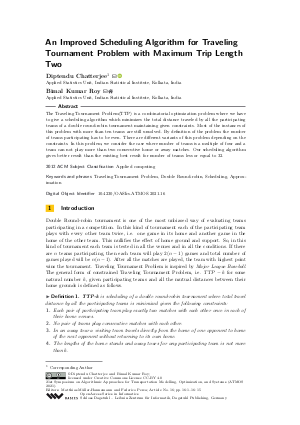An Improved Scheduling Algorithm for Traveling Tournament Problem with Maximum Trip Length Two
Authors
Diptendu Chatterjee  ,
Bimal Kumar Roy
,
Bimal Kumar Roy
-
Part of:
Volume:
21st Symposium on Algorithmic Approaches for Transportation Modelling, Optimization, and Systems (ATMOS 2021)
Part of: Series: Open Access Series in Informatics (OASIcs)
Part of: Conference: Symposium on Algorithmic Approaches for Transportation Modelling, Optimization, and Systems (ATMOS) - License:
 Creative Commons Attribution 4.0 International license
Creative Commons Attribution 4.0 International license
- Publication Date: 2021-09-27
File

PDF
OASIcs.ATMOS.2021.16.pdf
- Filesize: 0.66 MB
- 15 pages
Document Identifiers
Subject Classification
ACM Subject Classification
- Applied computing
Keywords
- Traveling Tournament Problem
- Double Round-robin
- Scheduling
- Approximation
Metrics
- Access Statistics
-
Total Accesses (updated on a weekly basis)
0PDF Downloads0Metadata Views
Abstract
The Traveling Tournament Problem(TTP) is a combinatorial optimization problem where we have to give a scheduling algorithm which minimizes the total distance traveled by all the participating teams of a double round-robin tournament maintaining given constraints. Most of the instances of this problem with more than ten teams are still unsolved. By definition of the problem the number of teams participating has to be even. There are different variants of this problem depending on the constraints. In this problem, we consider the case where number of teams is a multiple of four and a team can not play more than two consecutive home or away matches. Our scheduling algorithm gives better result than the existing best result for number of teams less or equal to 32.
Cite As Get BibTex
Diptendu Chatterjee and Bimal Kumar Roy. An Improved Scheduling Algorithm for Traveling Tournament Problem with Maximum Trip Length Two. In 21st Symposium on Algorithmic Approaches for Transportation Modelling, Optimization, and Systems (ATMOS 2021). Open Access Series in Informatics (OASIcs), Volume 96, pp. 16:1-16:15, Schloss Dagstuhl – Leibniz-Zentrum für Informatik (2021)
https://doi.org/10.4230/OASIcs.ATMOS.2021.16
BibTex
@InProceedings{chatterjee_et_al:OASIcs.ATMOS.2021.16,
author = {Chatterjee, Diptendu and Roy, Bimal Kumar},
title = {{An Improved Scheduling Algorithm for Traveling Tournament Problem with Maximum Trip Length Two}},
booktitle = {21st Symposium on Algorithmic Approaches for Transportation Modelling, Optimization, and Systems (ATMOS 2021)},
pages = {16:1--16:15},
series = {Open Access Series in Informatics (OASIcs)},
ISBN = {978-3-95977-213-6},
ISSN = {2190-6807},
year = {2021},
volume = {96},
editor = {M\"{u}ller-Hannemann, Matthias and Perea, Federico},
publisher = {Schloss Dagstuhl -- Leibniz-Zentrum f{\"u}r Informatik},
address = {Dagstuhl, Germany},
URL = {https://drops.dagstuhl.de/entities/document/10.4230/OASIcs.ATMOS.2021.16},
URN = {urn:nbn:de:0030-drops-148850},
doi = {10.4230/OASIcs.ATMOS.2021.16},
annote = {Keywords: Traveling Tournament Problem, Double Round-robin, Scheduling, Approximation}
}
Author Details
References
-
Aris Anagnostopoulos, Laurent Michel, Pascal Van Hentenryck, and Yannis Vergados. A simulated annealing approach to the traveling tournament problem. Journal of Scheduling, 9(2):177-193, 2006.

-
Rishiraj Bhattacharyya. Complexity of the unconstrained traveling tournament problem. Operations Research Letters, 44(5):649-654, 2016.

-
Dirk Briskorn, Andreas Drexl, and Frits CR Spieksma. Round robin tournaments and three index assignments. 4OR, 8(4):365-374, 2010.

-
Robert Thomas Campbell and DS Chen. A minimum distance basketball scheduling problem. Management science in sports, 4:15-26, 1976.

-
Dominique De Werra. Some models of graphs for scheduling sports competitions. Discrete Applied Mathematics, 21(1):47-65, 1988.

-
Luca Di Gaspero and Andrea Schaerf. A composite-neighborhood tabu search approach to the traveling tournament problem. Journal of Heuristics, 13(2):189-207, 2007.

-
Kelly Easton, George Nemhauser, and Michael Trick. The traveling tournament problem description and benchmarks. In International Conference on Principles and Practice of Constraint Programming, pages 580-584. Springer, 2001.

-
Kelly Easton, George Nemhauser, and Michael Trick. Solving the travelling tournament problem: A combined integer programming and constraint programming approach. In International Conference on the Practice and Theory of Automated Timetabling, pages 100-109. Springer, 2002.

-
Nobutomo Fujiwara, Shinji Imahori, Tomomi Matsui, and Ryuhei Miyashiro. Constructive algorithms for the constant distance traveling tournament problem. In International Conference on the Practice and Theory of Automated Timetabling, pages 135-146. Springer, 2006.

-
Marc Goerigk, Richard Hoshino, Ken-ichi Kawarabayashi, and Stephan Westphal. Solving the traveling tournament problem by packing three-vertex paths. In Twenty-Eighth AAAI Conference on Artificial Intelligence, 2014.

-
Richard Hoshino and Ken-ichi Kawarabayashi. The linear distance traveling tournament problem. In Twenty-Sixth AAAI Conference on Artificial Intelligence, 2012.

-
Richard Hoshino and Ken-ichi Kawarabayashi. An approximation algorithm for the bipartite traveling tournament problem. Mathematics of Operations Research, 38(4):720-728, 2013.

-
Shinji Imahori, Tomomi Matsui, and Ryuhei Miyashiro. A 2.75-approximation algorithm for the unconstrained traveling tournament problem. Annals of Operations Research, 218(1):237-247, 2014.

-
Graham Kendall, Sigrid Knust, Celso C Ribeiro, and Sebastián Urrutia. Scheduling in sports: An annotated bibliography. Computers & Operations Research, 37(1):1-19, 2010.

-
Andrew Lim, Brian Rodrigues, and Xingwen Zhang. A simulated annealing and hill-climbing algorithm for the traveling tournament problem. European Journal of Operational Research, 174(3):1459-1478, 2006.

-
Ryuhei Miyashiro, Tomomi Matsui, and Shinji Imahori. An approximation algorithm for the traveling tournament problem. Annals of Operations Research, 194(1):317-324, 2012.

-
Rasmus V Rasmussen and Michael A Trick. Round robin scheduling-a survey. European Journal of Operational Research, 188(3):617-636, 2008.

-
Clemens Thielen and Stephan Westphal. Complexity of the traveling tournament problem. Theoretical Computer Science, 412(4-5):345-351, 2011.

-
Clemens Thielen and Stephan Westphal. Approximation algorithms for ttp (2). Mathematical Methods of Operations Research, 76(1):1-20, 2012.

-
MA Trick. Challenge traveling tournament instances. http://mat.tepper.cmu.edu/TOURN/, 1999.

-
Pascal Van Hentenryck and Yannis Vergados. Population-based simulated annealing for traveling tournaments. In Proceedings of the National Conference on Artificial Intelligence, volume 22, page 267. Menlo Park, CA; Cambridge, MA; London; AAAI Press; MIT Press; 1999, 2007.

-
Stephan Westphal and Karl Noparlik. A 5.875-approximation for the traveling tournament problem. Annals of Operations Research, 218(1):347-360, 2014.

-
Mingyu Xiao and Shaowei Kou. An improved approximation algorithm for the traveling tournament problem with maximum trip length two. In 41st International Symposium on Mathematical Foundations of Computer Science (MFCS 2016). Schloss Dagstuhl-Leibniz-Zentrum fuer Informatik, 2016.

-
Daisuke Yamaguchi, Shinji Imahori, Ryuhei Miyashiro, and Tomomi Matsui. An improved approximation algorithm for the traveling tournament problem. Algorithmica, 61(4):1077, 2011.

